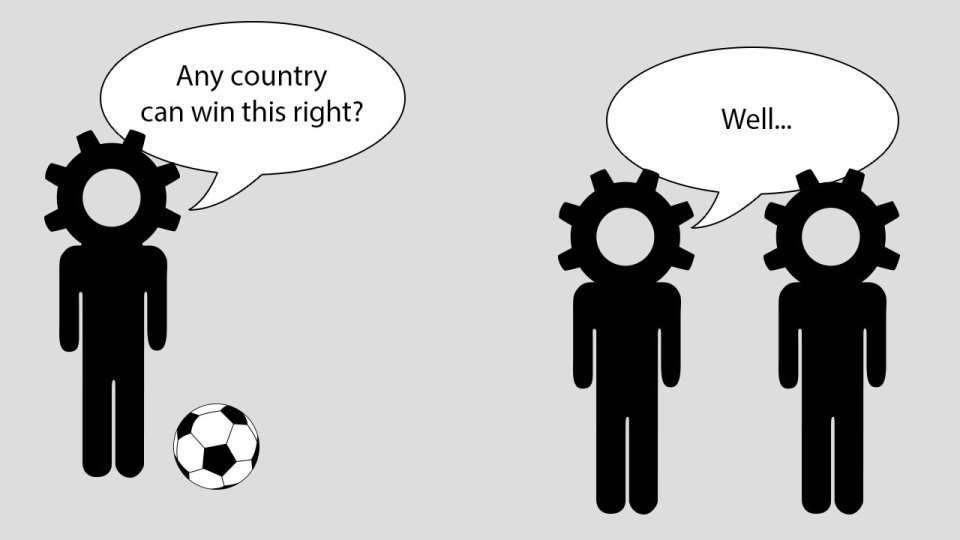I know many of you are thinking it’s easy to say you knew who was going to win after they already won. That’s fine. But I actually did know before they won it all and if you want to learn more about probability, I suggest you read the article.
I always love it when people do sports bracket challenges. They are so stupid and pointless. There’s no way you can know who will win. And if you do somehow get it right, you’re just guessing. But once they start playing a little bit, you have a sample size of data to analyze. If you know what to look for, you can predict what will happen. Let’s begin.
I don’t watch soccer all that much. I mainly watch the World and Euro Cups. That’s good enough for me. When the World Cup started I had no clue who would win just like everyone else. The only thing I knew for sure was Germany would not repeat. Because that rarely ever happens. And not only did that not happen, but they also didn’t even get out of the group stage.
But any time you watch any kind of tournament there’s always at least one thing that will happen that will tell you that team will win it all. But you have to be able to tell what that one thing is. Because you might be looking at the wrong thing. When France beat Argentina in the round of 16 I knew they were going to win it all. Let’s break down why that was.
In soccer (football) it’s obviously hard to score goals so if a team can score 3 goals in the span of 11 minutes against a pot 1 team in Argentina, they’re probably pretty good. For me, that was the thing I needed to see, and the moment I knew France was going to win it all. No other team had shown that explosiveness in this tournament. And if France could do it once, logic would dictate they could do it again. They sort of did when they scored two goals in six minutes in the World Cup Final. And once again, no other team scored like that the rest of the tournament.
If you need more proof, we can give you some by eliminating the other teams. The winner would more than likely have to be from pot 1 or pot 2. The likelihood of any of the other teams winning is very slim. In fact, the 1986 World Cup[1] was the last time a pot 1 team didn’t win. Argentina won then as a pot 2 team who was playing at home. Once the round of sixteen was over we were left with France, Uruguay, Brazil, Belgium, Russia, Croatia, and England from those pots. Notice how seven of the eight teams left were from the first two pots. Russia doesn’t count because they aren’t really in pot 1. They’re just there because they hosted. They can be eliminated. Then we can eliminate teams that already lost. Because if you lost at least once in the group stage, the probability is higher you will lose again. Draws don’t count. England lost so they can be eliminated. Russia also lost so they would have been eliminated anyway. This means there are only four other teams besides France that could win it all. I like those odds. But France was still the only team to show at that point they possessed explosive scoring. They also had one of the best players in the tournament, Kylian Mbappé. And they reminded me of the previous winner, Germany, who explosively scored five goals in 18 minutes at the last World Cup. I would have given France a 90% probability of winning at that point. And France played in the second of the 16 first-round games and their odds would have been that high even before the rest of the matches concluded. Because all the teams that didn’t end up winning were lower potted teams or teams that had already suffered a loss. Thus further proving this algorithm for picking a winner.
It’s important to remember the way probability works. It only works if everything that has been happening stays the same. If something unpredictable were to happen like an injury or a player missing a game because of a red card or a game going into a shootout, the prediction may no longer be valid. But none of that happened here.
